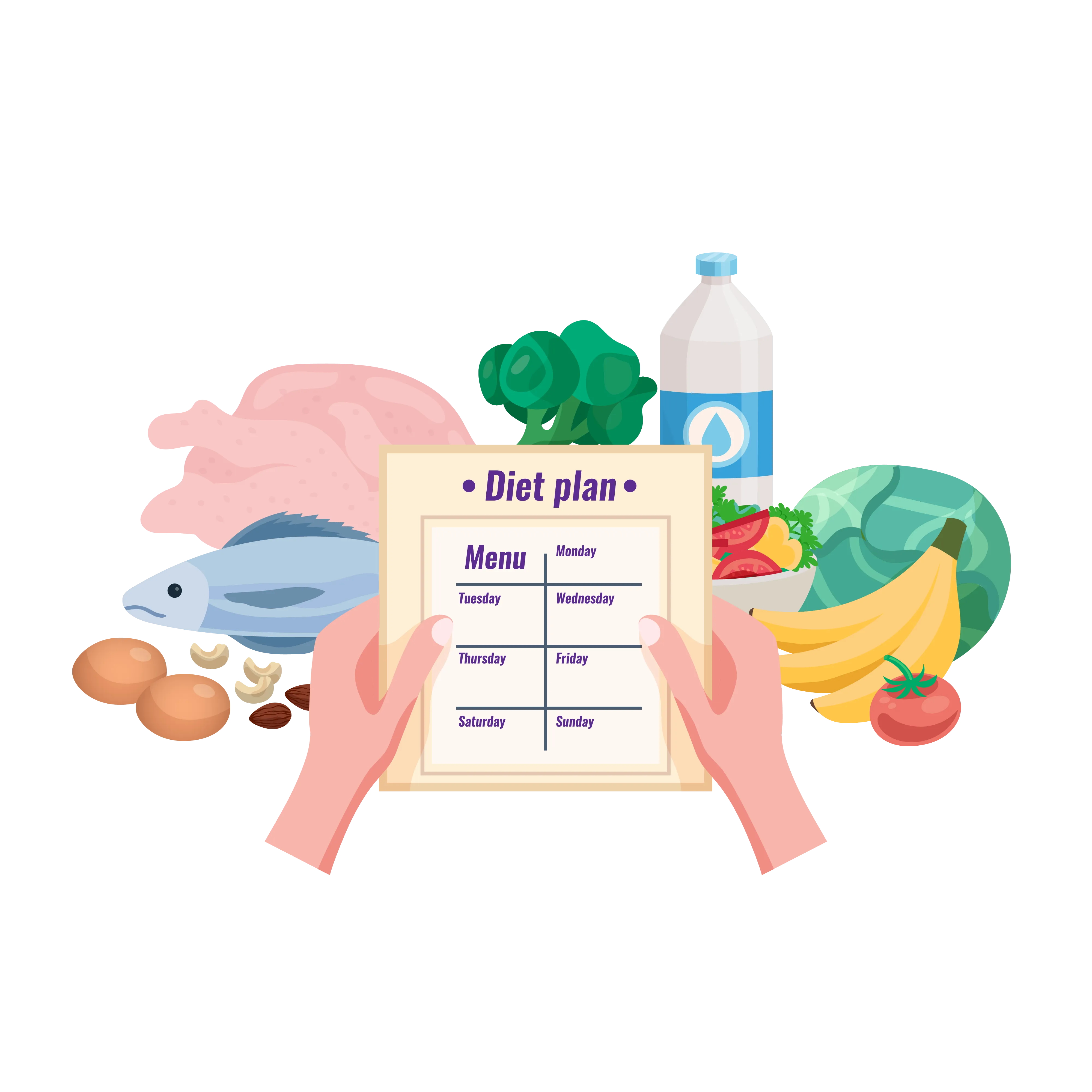Nutrition | 8 min read
Best Diet Plan for Weight Loss and Diet Chart: 7-Day Weight Loss Diet Plan
Medically reviewed by
Table of Content
Key Takeaways
- Cases of obesity in India are growing faster than the world average
- Indian meals are rich in carbohydrates, vitamins, and minerals
- The ideal calorie intake for men is 2500 and women is 2000 calories
Weight loss can be a challenge for most people. Though a priority for many, it requires discipline and commitment. Whether it is losing 5 kgs or 10 kgs, the principle behind weight loss is the same. Bodyweight is a measure of how much food is consumed and the total energy spent in various activities. Eating the right food is crucial to this process, and with the right guidance, an Indian diet plan can help you achieve this goal.
An Indian diet plan for weight loss is simply one that is healthy and balanced. More importantly, it comprises foods that are easily available in India, unlike other diet plans. A typical Indian meal is loaded with carbohydrates, fats, proteins, and fiber in adequate proportions. Be it cereals, legumes, green vegetables, or even meat, and this helps deliver needed nutrition to your body.
To know more about a healthy Indian diet plan for weight loss and how it can help you achieve weight loss in the long term, read on.
Balanced Indian Diet Plan for Weight Loss
Simply put, a balanced Indian diet plan for weight loss is one that prioritizes nutrition while still maintaining a healthy calorie deficient. Ideally, it should contain nutrient-dense foods while limiting foods that contain added sugars. According to sources, for healthy eating, diet plans should:
- Align with the calorific needs
- Have fruits, low-fat dairy products, whole grains, and vegetables
- Strike a balance between fiber-rich and protein-rich foods to help keep cravings in check
- Include foods that easily ensure proper intake of the daily required nutrients

Calorie Weight Loss Diet Chart Plan
The recommended calorie intake for men is 2500 and for women is 2000 calories. [1] Calories intake plays a major role in losing weight. As a rule, you should be consuming low-calorie food to lose weight. Keep in mind that eating junk food will do you more harm than good while on a low-calorie diet. Instead of being very disciplined during the week and binging on weekends, you should follow a simple and sustainable plan. This works best when you follow a diet based on the calorie requirements for your body. In this regard, an Indian meal works wonders.
The ideal Indian diet plan for weight loss contains various food items that are both nutritious and keep boredom away. Eat rotis with vegetable curries, bread, milk, fruit, or dalia for breakfast. This should be your biggest meal. Eat a slightly smaller quantity for lunch, including dal, sabzi, rotis, brown rice, curd, etc. Dinner should be the lightest meal, including khichdi, curd rice, dal rice with palak soup, or tomato shorba.
Additional Read: Fat Burning Foods For Weight Loss7-Day Weight Loss Diet Plan
Monday
- Breakfast: Oats with apples and cinnamon / 2 idlis with sambar
- Lunch: Brown rice or roti with dal, vegetable, and salad
- Snack: Seasonal fruit
- Dinner: Steamed rice or a roti with palak chole
Tuesday
- Breakfast: Skimmed milk with carrot poha
- Lunch: Steamed rice, chana masala and salad
- Snack: Buttermilk
- Dinner: Steamed vegetables, palak paneer and whole-grain roti
Wednesday
- Breakfast: Carrot poha + Almonds
- Lunch: Dal, vegetable curry and ghee roti or steamed rice
- Snack: Coconut water
- Dinner: Chana masala and spinach salad with roti
Thursday
- Breakfast: Paneer sandwich and tea
- Lunch: Brown rice, sambhar, sauteed vegetables, and curd
- Snack: Fresh juice
- Dinner: Paneer tikka masala and 1 roti
Friday
- Breakfast: Vegetable upma
- Lunch: Rajma with roti or steamed rice and low-fat curd
- Snack: Seasonal fruit
- Dinner: Masala-baked paneer, mixed vegetables with roti
Saturday
- Breakfast: Yoghurt with sliced fruit of choice
- Lunch: Mixed vegetable salad, Sabzi, and steamed rice
- Snack: Fresh juice
- Dinner: Paneer Kebab with chutney
Sunday
- Breakfast: Oats with milk
- Lunch: Dal, vegetable curry, and steamed rice
- Snack: Seasonal fruit
- Dinner: Mixed vegetable salad with chapati/roti and low-fat curd

Indian Foods for Weight Loss
When it comes to traditional Indian foods and ingredients, you have several options for weight loss. Do keep in mind that besides the choice of food, pay close attention to portion control. Weight loss hinges on the principles of eating healthy and in a calorie deficit. While you can introduce a deficit by increasing your activity and burning calories, do not assume that portion control isn’t just as important. Even with healthy foods, you can still consume more calories than recommended for your weight loss objective.
Here are a few Indian foods, across major food groups, that are known to help with weight loss.
- Ghee
- Steamed idli
- Lentils and legumes
- Roti
- Sambhar
- Tofu
- Paneer
- Khichdi
- Chikki
- Poha
This isn’t an exhaustive list and there are several other options, including drinks such as buttermilk, which can help you reach your goal.
Factors that Define an Indian Diet for Weight Loss
Indian meals provide you with carbs that are the main source of energy for the body. Consume fiber-rich complex carbs as they are digested slowly and are best for weight loss. Brown rice, ragi, and oats are good options.
Most Indian vegetarians struggle with protein intake. A high-protein diet helps you lose weight and build muscle. Proteins are found in a variety of Indian cuisines. Make dals, paneer, green veggies, milk, and sprouts a part of your daily diet.
Fiber-rich foods like oats, lentils, apples, and broccoli help in digestion and aid your heart. Such foods help you stay fuller. A healthy Indian diet plan should include at least 15 grams of fiber every day.
People who want to lose weight take a step back when it comes to food items with fats. However, fats are essential for your body, and experts suggest that 20% of your diet should contain healthy fats. Fatty yet healthy food includes oils like olive oil, soya bean, mustard oil, sunflower, and groundnut oil. Consume a controlled amount of pure ghee for your fat intake.
Vital vitamins including vitamin A, E, B12, D, calcium, and iron support metabolism, bone health, cell production. Nutritionists recommend eating 100 grams of green vegetables and 100 grams of fruits every day that contains these essential vitamins. Don’t miss out on oilseeds, nuts, and fruits. If you eat non-vegetarian food, ensure steamed fish or fish curry is also a part of your diet for omega-3 fatty acids.

Healthy Indian Diet Plan Importance for Weight Loss
There are several reasons why an Indian diet plan can help with weight loss. The simplest reason is that the average Indian diet plan will mainly consist of lentils and an assortment of vegetables. It isn’t very common to find many meat dishes in the typical diet and this can help keep calories in check, while ensuring proper intake of nutrients. For instance, a lot of the Indian diet plan food groups will have fruits, dairy, grains and lentils as the core ingredients. Combined, these cover the healthy fats, proteins, and carbohydrate intake requirements for a healthy diet.
What’s more, a lot of these plant-based diets are known to be beneficial for optimal bodily function. Some of these include better digestion, improved metabolism and reduced bloating. Adding to the upsides are the use of spices, which have their own set of healthy properties. So, if you are serious about weight loss, follow an Indian diet plan.
Benefits of Following an Indian Diet Plan
Well known for spices, flavours, and colours, Indian meals are full of benefits. Turmeric reduces heartburn, arthritis and prevents Alzheimer’s disease. Ginger, garlic, and chillies promote heart health and boost immunity. Spinach and tomatoes contain a high level of vitamins and antioxidants. Some common spices like cloves and cardamom also improve intestine and gut functioning. All dishes within Indian cuisine provide the necessary nutrition, minerals, and vitamins your body needs. Above all, Indian food offers a variety of dishes so that you never get bored.
Additional Read: Healthy Diet Plan to Maintaining Good HealthTips for Maintaining a Balanced Indian Diet Plan
Cases of obesity and being overweight have increased rapidly in India in recent decades. [2] This can cause high blood pressure, diabetes, heart disease, arthritis, respiratory problems, and more. In fact, this can even lower your quality of life [3].
- Following a diet is not enough. Sleep well, [4] drink enough water, [5] and do aerobics or cardio exercise.
- Avoid eating food from outside. Home-cooked Indian meals are better for you as they contain fewer preservatives and fat.
- Avoiding the consumption of junk or processed food.
- Follow a proper regime of having breakfast, lunch, and dinner on time. However, not following a proper timetable can lead to health issues and weight gain.
- Mindful eating is necessary. Therefore, avoid watching television or browsing while eating. Enjoy your meals and eat slowly to lose weight.
Which is the Best Diet Plan for Weight Loss?
The best diet plan for weight loss is one that has a healthy balance of all macro and micronutrients without depriving the body in any way. There are several diet plans online that claim to go this route or promise quick results, but many of these do not take the healthy route. These either neglect an entire macronutrient, like carb- or fat-free diets or have foods that do not combine well to ensure maximum nutrition. As such, there is no one best diet plan for weight loss as the foods required will differ with each individual.
The easiest way to get the best diet plan for weight loss is to speak with a doctor or a dietician. These professionals will assess your health markers, take note of your lifestyle choices, and consider your allergies before recommending foods that will work effectively for you.
A healthy Indian diet plan offers all the basic nutritional requirements. Making a conscious shift towards healthier eating options will aid weight loss tremendously. To make this journey a lot easier, book an appointment with a nutritionist on Bajaj Finserv Health. With professional help, achieving goals is easier!
References
- https://www.news-medical.net/health/How-Many-Calories-Should-You-Eat-Per-Day.aspx
- https://www.ncbi.nlm.nih.gov/pmc/articles/PMC7039458/
- https://www.cdc.gov/healthyweight/effects/index.html
- https://www.sleepfoundation.org/how-sleep-works/how-much-sleep-do-we-really-need
- https://www.webmd.com/diet/how-much-water-to-drink#1
Disclaimer
Please note that this article is solely meant for informational purposes and Bajaj Finserv Health Limited (“BFHL”) does not shoulder any responsibility of the views/advice/information expressed/given by the writer/reviewer/originator. This article should not be considered as a substitute for any medical advice, diagnosis or treatment. Always consult with your trusted physician/qualified healthcare professional to evaluate your medical condition. The above article has been reviewed by a qualified doctor and BFHL is not responsible for any damages for any information or services provided by any third party.





